For Rohingya, approaching monsoon poses most serious threat
COX'S BAZAR, BANGLADESH Marooned on a dusty slope in the world's largest refugee camp, Mr Osiur Rahman looked to the hill where a Rohingya girl was buried in a landslide just days earlier and contemplated his chances should the earth give way beneath his feet.
"Our families would be killed. There are children everywhere. We constantly fear that rain could trigger a landslide," the 53-year-old told AFP on the steep embankment where he lives with nine family members in a bamboo shack.
For the 700,000 Rohingya who have fled to south-east Bangladesh in the past nine months, the approaching monsoon season poses the most serious threat since they were violently expelled from Myanmar.
Close to one million of the stateless Muslim minority live in the Cox's Bazar district, but the new arrivals, stranded on unstable hills in bamboo and plastic shacks, are especially vulnerable.
A massive operation to shore up the camps against disaster is in overdrive, with bulldozers levelling hills and refugees bunkering down.
But as the rains approach, the young girl's death in a torrent of mud and rock has heightened fears of a much greater tragedy.
There is a dearth of safe land to relocate the estimated 200,000 refugees in direct danger of floods and landslides, and just 21,000 have been moved so far.
"We could have lives lost as people slide down hillsides and valleys are flooded with water," Mr Kevin Allen, head of the UNHCR refugee agency's operations in Cox's Bazar, said.
"They could face yet again another emergency, this time driven by mother nature."
The prediction is the camps' makeshift homes will receive more than 2.5m of rainfall over three months starting next month, roughly triple what Britain gets in a year.
CYCLONE
Last year, Cox's Bazar was battered by Cyclone Mora, causing an acute crisis. The Rohingya, who have fled persecution time and again, fear being on the run once more.
"Everybody is afraid, wondering where we will go if our houses are destroyed," Rohingya imam Muhammad Yusuf said.
The World Food Programmesaid thousands of porters were being assembled to carry food on foot if access roads are cut.
- AFP
Get The New Paper on your phone with the free TNP app. Download from the Apple App Store or Google Play Store now



